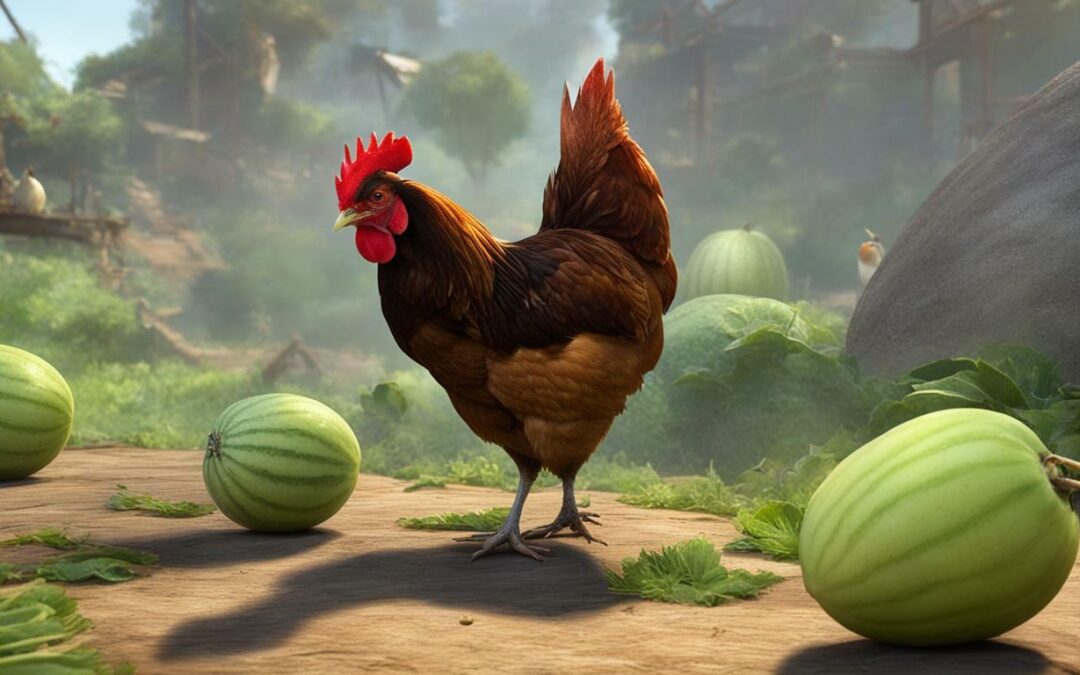Chickens are known for their diverse diet, but can they eat honeydew? Honeydew is a juicy and refreshing fruit that many of us enjoy during the summer months. If you’re a chicken owner, you may be wondering if it’s safe to feed this delicious fruit to your feathered friends. Luckily, the answer is yes! Chickens can indeed eat honeydew, and it can even provide them with some health benefits.
Key Takeaways:
- Honeydew is safe for chickens to eat in moderation.
- It is high in vitamins A and C, calcium, and potassium.
- Remove any seeds before feeding honeydew to chickens to prevent choking.
- Honeydew can support the immune system, promote digestion, and provide hydration for chickens.
- Other fruits and vegetables that chickens can enjoy include apples, berries, leafy greens, broccoli, cabbage, and carrots.
Nutritional Benefits of Honeydew for Chickens
Honeydew offers several nutritional benefits that can support the well-being of chickens. Rich in vitamins A and C, calcium, and potassium, honeydew can contribute to the overall health of these feathered friends. Vitamin A plays a crucial role in maintaining healthy vision, supporting cellular growth, and boosting the immune system. Vitamin C acts as an antioxidant, protecting the chickens’ cells from damage caused by free radicals. Calcium is important for strong bones and eggshell formation, while potassium helps maintain proper muscle function and electrolyte balance.
“Chickens can greatly benefit from the nutritious goodness of honeydew, but it’s essential to keep their intake in moderation due to its high natural sugar content.”
Feeding honeydew to chickens can also help with digestion and hydration. The high water content of honeydew keeps the chickens hydrated, especially during hot weather. Additionally, the natural sugars and fibers found in honeydew can aid in digestion and promote optimal gut health. However, it’s important to remove any seeds from the honeydew before feeding it to chickens. Seeds can present a choking hazard for poultry, so ensuring safe consumption is essential.
Other Fruits and Vegetables for Chickens
In addition to honeydew, chickens can enjoy a variety of other fruits and vegetables that offer nutritional benefits. Apples are a great source of vitamins A and C, while berries provide essential antioxidants. Leafy greens like spinach and kale are packed with vitamins and minerals, and broccoli offers a good dose of vitamins K and C. Cabbage can provide extra hydration, and carrots are rich in vitamin A. Including a variety of these fruits and vegetables in the chickens’ diet can contribute to their overall health and well-being.
Guidelines for Feeding Honeydew to Chickens
While honeydew is generally safe for chickens, it is important to follow certain guidelines when feeding it to them. Here are some tips to ensure your chickens can enjoy honeydew safely and without any negative health effects:
- Remove seeds: Before offering honeydew to your chickens, make sure to remove any seeds. Seeds can pose a choking hazard, so it’s crucial to eliminate them to keep your chickens safe.
- Moderation is key: Honeydew contains natural sugars, so it’s important to feed it to your chickens in moderation. Too much sugar can upset their digestive system or contribute to obesity. Offer small portions of honeydew as a treat, rather than making it a significant part of their daily diet.
- Various forms: Chickens can enjoy honeydew in different forms. You can serve it fresh, frozen, or even canned. Even though all these options are safe, fresh honeydew is generally preferable due to its higher nutrient content.
Feeding honeydew to chickens can provide several health benefits. It is rich in essential vitamins and minerals, including vitamins A and C, calcium, and potassium. These nutrients support your chickens’ immune system, promote healthy digestion, and contribute to overall hydration.
Other Fruits and Vegetables for Chickens
In addition to honeydew, there are several other fruits and vegetables that are safe and beneficial for chickens to consume. Consider adding these options to their diet:
- Apples: A great source of fiber and vitamins.
- Berries: Rich in antioxidants and vitamin C.
- Leafy greens: Spinach, kale, and lettuce are excellent sources of nutrients.
- Broccoli: Packed with vitamins and minerals, including calcium.
- Cabbage: Provides vitamins K and C.
- Carrots: High in beta-carotene and vitamin A.
Introducing a variety of fruits and vegetables into your chickens’ diet can help provide a well-rounded nutrition and promote their overall health and well-being.
Health Benefits of Honeydew for Chickens
Including honeydew in the diet of chickens can offer a range of health benefits. Honeydew is a nutritious fruit that is high in vitamins A and C, calcium, and potassium, which are essential for a chicken’s overall health and wellbeing. These vitamins and minerals can support their immune system, help with digestion, and provide hydration.
Honeydew is known for its high water content, making it a great source of hydration for chickens, especially during hot weather. The water content in honeydew can help prevent dehydration and keep chickens cool and comfortable. Additionally, the natural sugars in honeydew can provide a quick energy boost for chickens, helping them stay active and healthy.
Feeding honeydew to chickens can also promote good digestion. The fiber content in honeydew can aid in regulating a chicken’s digestive system, preventing issues such as constipation. It can also support the overall health of their digestive tract, ensuring that they can properly absorb nutrients from their food.
Other Fruits and Vegetables for Chickens
In addition to honeydew, there are several other fruits and vegetables that are safe and beneficial for chickens to consume. These include apples, berries, leafy greens, broccoli, cabbage, and carrots.
- Apples: A great source of vitamins A and C, as well as fiber.
- Berries: Packed with antioxidants and vitamins that can support a chicken’s immune system.
- Leafy greens: Rich in vitamins and minerals, including calcium for strong bones and eggs.
- Broccoli: Contains vitamins A and C, calcium, and iron.
- Cabbage: Provides antioxidants and vitamins, including folate.
- Carrots: A good source of vitamin A and beta-carotene.
When feeding fruits and vegetables to chickens, it is important to introduce them gradually and in moderation. This will allow their digestive systems to adjust and minimize the risk of any digestive upset. Always provide fresh fruits and vegetables, wash them thoroughly, and remove any seeds or pits to prevent choking hazards.
Other Fruits and Vegetables for Chickens
In addition to honeydew, there are several other fruits and vegetables that can make a healthy addition to a chicken’s diet. These options provide a variety of vitamins and minerals, helping to keep your chickens in optimal health.
Apples for Chickens:
Apples are a great choice for chickens, as they are packed with fiber and vitamin C. They can be given to chickens in small slices or grated, providing a tasty and nutritious treat.
Berries for Chickens:
Berries, such as strawberries, blueberries, and raspberries, are rich in antioxidants and can be a delicious addition to a chicken’s diet. These bite-sized fruits can be served whole or diced, offering a burst of flavor and beneficial nutrients.
Leafy Greens for Chickens:
Leafy greens, like spinach, kale, and lettuce, are excellent sources of essential vitamins and minerals, including vitamin K and iron. These greens can be offered to chickens either fresh or cooked, providing them with a healthy dose of nutrients.
Broccoli and Cabbage for Chickens:
Broccoli and cabbage are cruciferous vegetables that can be fed to chickens in small amounts. They are rich in vitamins A and C, as well as fiber. These vegetables can be chopped into small pieces and added to your chicken’s feed or offered as a snack.
Carrots for Chickens:
Carrots are a popular treat for chickens, as they are crunchy and packed with beta-carotene. They can be given to chickens in small pieces or grated, providing a nutritious snack that promotes healthy eyesight.
Remember, when introducing new foods to your chickens, it’s important to do so gradually and in moderation. Monitor their response and make sure they are tolerating the new additions well. By incorporating a variety of fruits and vegetables into their diet, you can ensure that your chickens are getting a well-rounded and nutritious meal.
Conclusion
In conclusion, honeydew can be a nutritious and enjoyable addition to a chicken’s diet when fed responsibly. It is safe for chickens to eat and contains essential vitamins and minerals like vitamin A, vitamin C, calcium, and potassium, which contribute to their overall health.
When feeding honeydew to chickens, it is important to remove any seeds to prevent choking. Additionally, honeydew should be given to chickens in moderation due to its high natural sugar content. This ensures that chickens receive the nutritional benefits without consuming an excessive amount of sugar.
Feeding honeydew to chickens can provide numerous health benefits. It supports their immune system, helping them stay healthy and fight off diseases. Honeydew also promotes digestion, aiding in the proper digestion of food and preventing digestive issues in chickens. Furthermore, honeydew is hydrating for chickens, contributing to their overall well-being.
Aside from honeydew, there are other fruits and vegetables that chickens can enjoy. Apples, berries, leafy greens like spinach and lettuce, broccoli, cabbage, and carrots are all safe and beneficial for chickens to consume. These options offer a variety of vitamins, minerals, and additional health benefits to supplement their diet.
FAQ
Q: Can chickens eat honeydew?
A: Yes, chickens can eat honeydew. It is safe and healthy for them.
Q: What are the nutritional benefits of honeydew for chickens?
A: Honeydew is high in vitamins A and C, calcium, and potassium, which are beneficial for chicken health.
Q: How should honeydew be fed to chickens?
A: It is important to remove any seeds before feeding honeydew to chickens. It should also be given in moderation due to its high natural sugar content. Fresh, frozen, or canned honeydew can be offered to chickens.
Q: What health benefits does honeydew provide to chickens?
A: Honeydew can support the immune system, promote digestion, and provide hydration for chickens.
Q: Are there other fruits and vegetables that chickens can eat?
A: Yes, chickens can also enjoy apples, berries, leafy greens, broccoli, cabbage, and carrots, among others.

